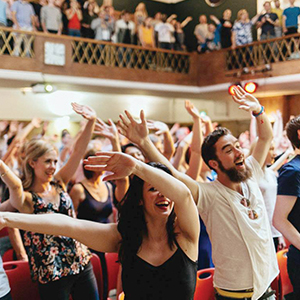Christianity in Britain has reached a tipping point, with young people increasingly having no religious beliefs and feeling alienated from the Churches, Britain’s leading sociologist of religion has claimed.
According to Linda Woodhead, professor of the sociology of religion at Lancaster University, new research shows that the country’s religious identity is rapidly changing, with those professing “no religion” in the ascendant.
In her British Academy Lecture, delivered on Tuesday, and based on her research, Professor Woodhead said that the rise of a generation professing no religious belief (“nones”) is due not only to the fact that people have become less religious but that Churches have become more overtly so. The two processes, said Professor Woodhead, are connected.
“The ties which once bound religion and society have frayed and loosened, and both Church and people have played an active part in the long separation and recent divorce,” she said. “Christianity is at a crossroads.”
This was a particular crisis for the Churches of England and Scotland, she said, which were becoming increasingly distant from the general population and did not share its liberal views on personal morality. The Catholic Church had also shown evidence of declining attendance but its numbers were shored up by recent migrants.
According to the YouGov poll, conducted by Woodhead with a sample of 1,500 people, in January 2013, 37 per cent of the population of Britain reported having no religion. By February 2015 that had gone up to 42 per cent and in a further survey carried out last month, the proportion had risen to 46 per cent, including a majority of white Britons.
“No religion is the new norm,” said Professor Woodhead, “and there is every indication that its majority share will continue to grow.” Professor Woodhead made a distinction between atheists who actively reject religion – typified by the biologist Richard Dawkins – and those who simply do not believe, and say “none” when questioned about belief.
“‘Nones’ are being hatched while Christians are being dispatched,” explained Woodhead.
What marks the category of “nones” out is that they are not, simply, non-religious. Only 13 per cent of them, reveals the survey, hold anti-religious views, while under half say they are atheist.
“Atheism,” points out Woodhead, “has been growing much less quickly than no religion, and has a less youthful age structure.” Instead, “nones” are identified by their diversity of belief and are “strikingly liberal”. Twice as many under-forties are of no religion than are Christian.
The poll reveals that 46 per cent of “nones” supported the current abortion law, 62 per cent thought same-sex marriage was right, and 85 per cent supported a liberalisation of the law concerning euthanasia. Woodhead argues that the gap between Church and society has been widened by a series of moral stands taken by church leaders over ethical issues.
Archbishop Justin Welby’s recent declaration that the decline in church attendance is due to a prevailing “anti-Christian culture” is, according to Woodhead, not the whole story. “The Church of England has a responsibility not to be sectarian,” she said. “It’s not just that Britons have been losing their religion, it’s that Churches and clerics have also been losing them through their actions and inactions,” she claimed. “It takes two to tango – or to leave the dance floor.”
21 January 2016, The Tablet
Woodhead: ‘No religion is the new norm’
 Loading ...
Loading ...
Get Instant Access
Subscribe to The Tablet for just £7.99
Subscribe today to take advantage of our introductory offers and enjoy 30 days' access for just £7.99



